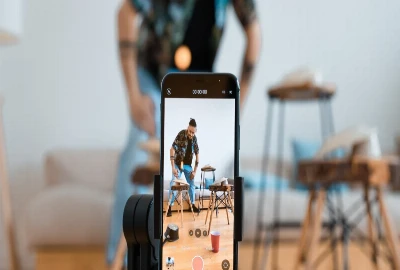AI Actors & Virtual Voices: The Next Evolution of Performance?

The entertainment industry has always thrived on innovation, whether it was the introduction of sound in cinema, the shift to color films, or the rise of CGI. Today, another groundbreaking evolution is underway: the rise of AI actors and virtual voices. These technologies are reshaping how stories are told, who tells them, and even what it means to perform. From Hollywood blockbusters to indie video games and global streaming platforms, artificial intelligence is stepping into the spotlight.
In this blog, we’ll explore the transformative role of AI actors and virtual voices, their potential benefits and challenges, and what this means for the future of performance in film, gaming, advertising, and beyond.
The Rise of AI Actors in Modern Entertainment

AI actors are no longer confined to science fiction films—they are already here, playing roles in commercials, films, and even social media campaigns. These digital performers are created using a mix of AI-driven animation, voice synthesis, and performance capture. Studios and brands are beginning to experiment with AI-generated characters because they offer flexibility, cost efficiency, and endless creative possibilities.
What Makes AI Actors Different from Human Actors?
Unlike human performers, AI actors don’t need rest, don’t age, and can be endlessly modified to fit creative visions. They can portray a wide range of characters without the physical and emotional limitations of real humans. An AI actor can star in a film set in ancient Rome one day and play a futuristic space explorer the next, all without the challenges of reshoots or scheduling conflicts.
How Hollywood Is Adopting AI Actors
Some filmmakers are already using AI to “de-age” human actors or bring back deceased performers for new projects. For example, digital recreations of classic stars have appeared in blockbuster franchises, sparking debates about authenticity. As AI becomes more advanced, full-fledged AI actors could replace extras, background characters, or even leading roles in certain types of productions.
The Cost Advantage of AI Actors
Hiring human actors comes with production costs—contracts, unions, travel, accommodations, and time. AI actors, on the other hand, can be created once and reused multiple times. This economic advantage makes them appealing for advertising campaigns and smaller studios looking to cut budgets without compromising on visual quality.
Virtual Voices: Redefining the Sound of Storytelling

While AI actors handle the visual side, virtual voices are revolutionizing audio performance. AI voice generators can mimic human speech with stunning accuracy, capturing tone, cadence, and even emotion. This is particularly powerful in industries like gaming, audiobooks, advertising, and dubbing for global content.
Natural-Sounding AI Voices
Today’s AI-generated voices sound more natural than ever, often indistinguishable from real human voice actors. Developers are training models on massive datasets, enabling AI to replicate not just language but also subtle nuances like hesitation, laughter, or accents.
AI Voices in Gaming and Animation
Video game developers are using AI voices to create vast universes with hundreds of unique characters. Instead of hiring dozens of actors for minor roles, AI can generate lifelike voices on demand. Similarly, animated shows and films are exploring AI voices for background characters and secondary dialogue, reducing production time.
Accessibility and Inclusivity Through Virtual Voices
AI voices are also expanding accessibility. Text-to-speech technologies powered by AI allow content to be consumed by visually impaired audiences or in multilingual markets. This democratization of storytelling ensures that more people can experience narratives regardless of language or ability.
Benefits of AI Actors and Virtual Voices for Creators

The integration of AI into performance isn’t just about replacing human talent—it’s also about empowering creators. Independent filmmakers, game developers, and advertisers now have access to tools that were once reserved for big-budget studios.
Faster Production Cycles
AI actors and voices streamline the production pipeline. What once took weeks of shooting and editing can now be accomplished in days. Automated dubbing, instant script-to-voice technology, and digital actors accelerate creativity while reducing turnaround time.
Creative Freedom Without Limits
AI allows creators to experiment without worrying about physical constraints. Want to set your story in an impossible location or use a character that defies biology? AI actors and voices make it possible. The only limit is imagination.
Lower Barriers to Entry for Indie Creators
Smaller studios and indie creators often face budget challenges when hiring actors or voice talent. With AI tools, they can produce high-quality content without the financial burden. This levels the playing field and enables fresh, diverse voices to enter the industry.
Ethical Dilemmas in the Age of Digital Performers

Despite their benefits, AI actors and virtual voices raise significant ethical concerns. The line between human creativity and machine replication is blurring, and questions of authenticity, consent, and ownership are becoming urgent.
The Debate Over Digital Resurrection
Bringing back deceased actors through AI has sparked heated debates. Is it a tribute to their legacy or an exploitation of their image? While some fans appreciate seeing their favorite stars return, others argue it diminishes the authenticity of performance.
Threats to Human Employment
Many voice actors, extras, and even lead performers fear that AI could replace them. The entertainment industry thrives on human talent, and while AI can replicate performance, it lacks the emotional depth and lived experiences that real actors bring.
Ownership and Consent Issues
Who owns an AI-generated performance? If an AI voice is trained on a real actor’s recordings, should that actor be compensated? These legal and ethical questions are still being debated, and regulations will likely shape the future of AI in entertainment.
How AI Is Transforming Film, TV, and Gaming

The applications of AI actors and voices go far beyond experimental projects—they are actively transforming entire industries.
AI in Film and Television
Studios are experimenting with AI actors for background characters, reducing the need for extras. AI voices are also being used for quick rewrites, automated dubbing, and global distribution of content. Streaming platforms are particularly invested in AI tools to localize shows for international markets.
AI in Video Games
In gaming, AI voices allow for immersive worlds with thousands of characters. Players can interact with AI-driven NPCs (non-playable characters) that respond with unique voices, creating dynamic experiences that feel alive.
AI in Advertising and Marketing
Brands are using AI-generated spokespeople and voices for commercials. These digital influencers can represent companies consistently across platforms, never aging, and always available. It’s a new era of brand identity powered by AI.
Human-AI Collaboration in Performance

The future of entertainment may not be about replacing humans with AI but rather about collaboration. Human actors and AI performers can complement each other, creating richer storytelling experiences.
Enhancing Human Performance
AI can support actors by handling repetitive or background tasks, allowing humans to focus on emotionally demanding scenes. For example, an AI-generated crowd can populate a stadium, while the main actors deliver heartfelt performances.
New Creative Possibilities
Directors and writers can use AI actors as “digital sketches” to test out scenes before casting real performers. Virtual voices can help scriptwriters hear dialogue instantly, refining the script in real-time.
Preserving Human Uniqueness
While AI can mimic performance, the human touch remains irreplaceable. Collaborations between AI and human talent ensure that emotional authenticity stays at the heart of storytelling.




